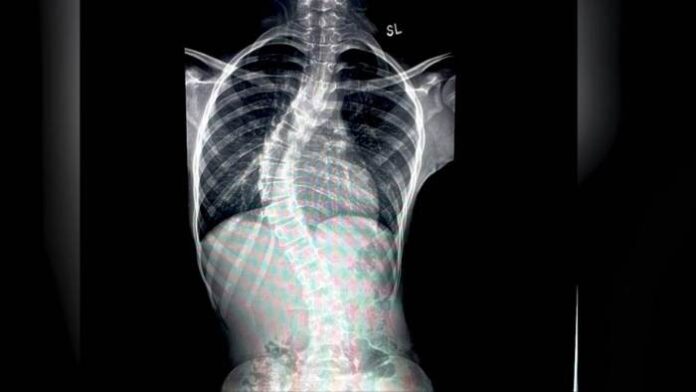Bengaluru, December 20, 2023 : Fortis Hospital, Bannerghatta Road recently gave a new lease of life to a 14-year-old girl with Scoliosis, a condition in which there is an abnormal curvature of the spine. The young girl, a native of Nigeria experienced a sudden deformity in her spine, 6 months ago. A multidisciplinary team of dedicated doctors, led by renowned surgeon Dr. Rajakumar Deshpande, Director – Department of Neurosurgery, Fortis Hospital, Bannerghatta Road, successfully treated the patient.
Sarah (name changed) was leading a normal life until 6 months ago when her mother noticed a lump on the right side of her upper back. The lump which was initially small in size kept growing gradually with right shoulder appearing to be at a higher level than the left. As a result, she even started experiencing pain in her back after lifting or carrying heavy weights. Her mother then took her to a local hospital where they were referred to Fortis Hospital Bannerghatta.
On admission, an MRI scan revealed that the patient’s spinal curvature ranging from D4 (thoracic spine) to L1 (lumbar spine) measured approximately 60 degrees indicating moderate scoliosis. Considering the risks associated with spine surgery, paediatrician was consulted for patient’s fitness for the surgery and gynaecologist was consulted for her delayed puberty. Post which, a team of skilled neuro-surgeons devised a surgical plan involving pedicle screw fixation and correction maneuvers to correct the deformity.
Explaining the complex surgical procedure Dr. Rajakumar Deshpande, Director – Department of Neurosurgery, Fortis Hospital, Bannerghatta Road said, “Pedicle screw fixation involves placement of screws into the bony projections that extend from the back of each vertebrae (backbones). The screws hold the vertebral segments together firmly and prevent excessive movement. This technique helps stabilize the spine, correct deformity, relieve pain and facilitate the healing process. However, precise placement of screws is critical and extremely challenging in spinal surgeries. Hence, we used an intraoperative imaging system called O-Arm which provides 3D images of the surgical area. This enabled us to assess the position of screws and make necessary adjustments during the surgery. In addition, we also monitored the patient’s neurological responses (function of brain, spinal cord, nerves & muscles) throughout the surgical procedure using Intraoperative Neuromonitoring technology (IONM) for any significant changes or abnormalities to prevent any permanent damage. The complex surgery which took eight long hours was successfully completed following which the patient was kept under observation in the Neurosurgical Intensive Care Unit (NSICU) for a day. She was then gradually given physiotherapy and discharged 24 days post-surgery after showing progressive recovery without any significant complications.”
Mr. Akshay Oleti, Business Head, Fortis Hospitals, Bangalore said, “We are proud to have treated this complex case using advanced medical technologies. This case highlights the significant progress in medical technology and expertise available at Fortis Hospital Bannerghatta. The successful surgery and subsequent recovery demonstrate the dedication and commitment of the medical team involved in treatment. We wish the patient a speedy recovery and a healthy future. Her story serves as an inspiration to other individuals facing similar health challenges, offering hope and reassurance that effective treatments are available.”
Corporate Comm India (CCI Newswire)























